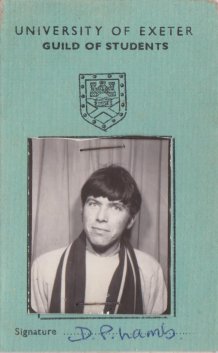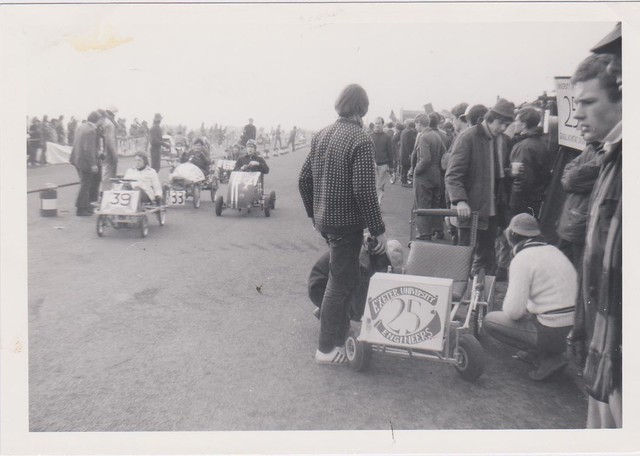
Derek Lamb's Guild Card from 1967
Adjusting by degrees; ‘coming up’ 50 years ago
Derek Lamb (Economic History & Geography, 1970) writes about his experiences at Exeter in the late 1960s.
On 2 October 1967, I caught the 08:00 train from Paddington to Exeter. That Monday was my first time in the city; I had never been to any university campus, let alone Exeter. My grasp of university life was based entirely on duffel coated protesters, rag mags and University Challenge. I really did not have a clue.
O level Latin was a prerequisite to read history in 1967; it was not one of the eight that I possessed. However, economic history required no such condition. Exeter was one of the few that offered this with geography as a combined honours degree. So, beguiled by an attractively illustrated prospectus and knowing vaguely where Exeter was, I accepted their offer of BCC. The sprocket holes and exclusive use of upper case throughout indicated that this paperwork had been produced by a computer. It was probably my first experience of IT.
It was all academic really…I was more likely to go to the moon than achieve those grades. So eight months later, I was more than surprised when another piece of computer generated paperwork informed me that I secured them. I am still waiting for the call to join the American space programme.
There were several factors that dogged my first weeks at Exeter. The most significant was the accommodation. Universities grew rapidly in the 1950s and 1960s; suitable accommodation was not the priority. Perhaps half the men in my intake were allocated to digs; in contrast, all women were in halls of residence. Lodgings were not uncommon then, so they were felt to be suitable for 18 and 19 year old students away from home for the first time. While some took one or two students and treated them like one of the family, others saw it as a business opportunity. There were seven of us in our digs in Blackboy Road. Fellow students living in halls talked of warm rooms, good food, hot showers and a relaxed regime. My notable memories of those digs include:
- grey gravy
- one bath a week (Tuesday, 9:30pm)
- paraffin heater in the shared bedroom
The rooms and furnishings were pretty shabby; our landlady was not really cut out for the ‘hospitality’ industry. We were expected to be out all day but in by 11pm. We had to record our presence on a board in the hall. Just to add to the gloom, it seemed to rain every day. I bought my first umbrella. Curiously, it brought out the Dunkirk Spirit; the adversity was a great bonder.
One of the seven stayed less than a week. Aged 21, the rules allowed him to live in a flat and he promptly disappeared. The rest of us found new digs and left at Christmas.
Friendships from academic sources were more difficult. Any social studies course involved a common foundation year, so lectures seldom had fewer than 200 students. It was difficult to make friends in those circumstances. Despite good A levels and a determination to work hard, much of the content went over my head. What is ‘log-log’ paper? And why didn’t the graphs have any numbers on the axes. And how much reading should I be doing? Pastoral care seems much more thorough now. I was allocated a personal tutor but barely knew him. I concluded that there was little he could do in the short term anyway; the solution lay largely in my hands. Fortunately, around mid- November, it all seemed to click into place and I never looked back.
Apart from this uneven start, I thoroughly enjoyed Exeter, especially the life in hall (Murray House, Duryard). The social scene was good too…discos, dances, reviews, ‘balls’, the newly opened Northcote Theatre. Back then, it was rare to leave home until you married, so the independence was particularly appealing. I was genuinely interested in the academic side of university and, with a couple of exceptions; the lecturers were competent and even charismatic.
I am ashamed to say that I made little use of the sports or cultural opportunities there, beyond the more superficial, like the cinema society. However, I was active in the Rag Weeks and Social Secretary of Murray in 1969-70. Responsibilities involved some organising of discos and a Grand Masked Ball at The Salston Hotel, Ottery St Mary. It also ensured a supply of free tickets to social functions in other halls.
Holidays, business trips and reunions have kept me in touch with both the University and the city. In the later 1960s, there were about 3,000 students and the campus was spacious, with large open areas giving it an almost stately appearance. Spiralling student numbers has meant that all the open spaces are now accommodation, administration and teaching blocks. I was shocked at how cramped some parts have become.
The city has blossomed. In 1967, there were relics of the devastating Baedeker Raid of 1942. Car parks occupied the rough ground of old bomb sites and some buildings were propped with massive timbers. For many years, standing outside the Odeon offered an unimpeded view of the Cathedral, half a mile away. While the rebuilt centre was prosperous enough then, adjacent roads were rather down at heel. Fore Street, the area behind the Guildhall (including Queen Street and North Street) and the old Quay had all seen better times. Greater student numbers, relocation of businesses and especially the extension of the M5 have transformed the city. The post war buildings have been softened, the dual carriageway centre pedestrianised. There is far more popular culture and entertainment on offer. Night life then encompassed the two cinemas, numerous pubs and the odd club. Then, an inspector blew his whistle at 22:50 and the last busses left the High Street radiating towards the suburbs. The city then fell silent. ‘Town and Gown’, have clearly benefitted each other in the intervening years.
I am in regular contact with a couple of Exeter friends; there are many more with whom I remain acquainted. About a dozen of us meet for a meal in London every year. There is one that I see more frequently…Gillian Ford, spinster of Jessie Montgomery House, Duryard Halls. We met in 1968 and 2017 is our 45th wedding anniversary.
To what extent my degree helped my career is a difficult point to quantify. It was a much rarer qualification compared to today; less than 5% of people in their early 20s were graduates. A degree meant you had ‘a trained mind’, so it did open doors. Perhaps I should have walked through more of them? Each Spring Term, the cream of the UK’s employers conducted a ‘milk round’ visiting all of the universities. You could have an initial interview with as many as you liked. By then, I had already set my mind on teaching and had secured a place at Thornlea for a PGCE. However, having a degree certainly bolstered my confidence throughout my working life. To be honest, my children have probably benefitted as much as me. Because of my example, it was natural for them to want to go to university whereas for me, it was a step into the unknown.
With hindsight, I probably was not ready for all the changes. I was the first in my family (and probably from the entire Whitefields Estate) to go to University. From the perspective of 50 years on, happily married and following a varied and rewarding working life, much of this good fortune is attributable to Exeter University. However, if I had known what awaited me in those first weeks, would I still have caught the 08:00 from Paddington on 2 October 1967?
Derek Lamb (Economic History & Geography, 1970)
Date: 25 May 2017

